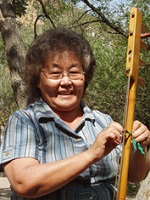The role of Russian specialists in the establishment of professional music in 20th century Tuva
DOI:
https://doi.org/10.25178/nit.2019.1.9Keywords:
Tuva; Tuvan history; Russians in Tuva; history of music; Tuvan music; professional art; Soviet specialist; composerAbstract
The article examines the contribution made by Russian professional musicians, composers, choreographers and others in the establishment and development of Tuvan musical culture in the Soviet period. They have been coming Tuva explicitly for the purpose of setting up musical collectives, training and working with talented Tuvans in the regional educational institutions. This process is considered an example of mutual influence of Soviet (and first of all, Russian) culture on its Tuvan counterpart. This article for the first time examines the life and work of those specialists whose names had been suppressed in the Soviet period as they fell victims to Stalin's purges. The author relied on information from both published works on the history of Tuvan music and original materials.
The first to be named is the military bandmaster S. G. Korovin, who became the head of the brass band of the cavalry regiment of the Tuvan people's revolutionary army. He recorded and arranged folk songs, taught Tuvans musical literacy. In the early 1940s, the first group of professionals arrived from the Soviet Union. Among them were composer and conductor of brass orchestra L. I. Izrailevich, flutist and teacher R. G. Mironovich, choir conductor S. I. Bulatov, composer and teacher A. K. Feldman, ballet teacher and master A. V. Shatin, to name only a few. They were engaged in educating musicians, recording and arranging Tuvan musical folklore and also did some original composing. Also worth mentioning is the contribution made by the teachers of children's music school No. 1 of the 1950s-1960s.
Educational work of Soviet musicians bore its fruit as soon at the end of their first year in Tuva. The first songs were composed by A. Chyrgal-ool, M. Munsaka, R. Candensis, V. Kok-ool, A. Laptan and others. The first Tuvan professionals formed the core of the troupe of the national musical drama theatre. But the influence was mutual: Russian specialists learned from Tuvan colleagues, too.
References
Aksenov, A. N. (1964) Tuvinskaia narodnaia muzyka [Tuvan folk music]. Moscow, Muzyka. 255 p. (In Russ.).
Gippius, E. V. (1964) Predislovie redaktora [Editor's Preface]. In: Aksenov, A. N. (1964) Tuvinskaia narodnaia muzyka [Tuvan folk music]. Moscow, Muzyka. 255 p. Pp. 3–13 (In Russ.).
Kazantseva, Z. K. (2002) Rozhdennyi pet'. K 80-letiiu so dnia rozhdeniia R. D. Kendenbilia [Born to sing. To the 80th anniversary of R. D. Kendenbil’]. Kyzyl, Tipografiia KTsO «Anyiak». 92 p. (In Russ.).
Kazantseva, Z. K. (2003) A. B. Chyrgal-ool: zhizn' i tvorchestvo [A. B. Chyrgal-ool: life and work]. Kyzyl, TuvIKOPR SO RAN. 188 p. (In Russ.).
Kazantseva, Z. K. (2003) Ranenyi orel [A wounded eagle]. Kyzyl, TuvIKOPR SO RAN. 68 p. (In Russ.).
Karelina, E. K. (2009) Istoriia tuvinskoi muzyki ot padeniia dinastii Tsin do nashikh dnei [The history of Tuvan music from the fall of the Qing dynasty to the present day]. Moscow, Kompozitor. 552 p. (In Russ.).
Karelina, E. K. (2014) Muzyka v zhizni Maksima Munzuka [Music in Maxim Munzuk’s life]. The New Research of Tuva, no. 1 [online] Available at: https://nit.tuva.asia/nit/article/view/175 (access date: 09.09.2018). (In Russ.).
Mironovich, R. G. (1971) Vospominaniia [Memoirs]. In: Liudi tuvinskogo teatra [The People of the Tuva theatre] / ed. by K. Sagdy. Kyzyl, Tuvan book publisher. 184 p. Pp. 33–37. (In Russ.).
Munzuk, M. and Kiunzegesh, Iu. (1956) Yrlar [Songs]. Kyzyl, Tuvan book publisher. 192 p. (In Tuv.).
Osipenko, G. A. (1985) Formirovanie tuvinskoi simfonicheskoi muzyki (1957–1980) [The rise of Tuvan symphonic music (1957–1980)]: Diss. … Candidate of Arts. Novosibirsk. 179 p. (In Russ.).
Suzukei, V. Iu. (2002) Slepoi muzykant: o V. S. Bez’iazykove [The blind musician: on V. S. Bezyazykov]. Tuvinskaia pravda, 16 April, no. 116, pp. 3–4. (In Russ.).
Suzukei, V. Iu. (2007) Muzykal'naia kul'tura Tuvy v XX stoletii [The musical culture of Tuva in 20th century]. Moscow, Kompozitor Publ. Haus. 408 p. (In Russ.).
Tsybikova-Danzyn, I. A. (2004) Fortepiannoe tvorchestvo kompozitorov Tuvy [The piano works of composers of Tuva]: Diss. … Candidate of Arts. Ulan-Ude. 188 p. (In Russ.).
Published
How to Cite
Suzukey V. Yu. The role of Russian specialists in the establishment of professional music in 20th century Tuva. The New Research of Tuva, 2019, no. 1 [on-line] Available at: https://nit.tuva.asia/nit/article/view/833 (accessed: ... ). DOI: 10.25178/nit.2019.1.9
Issue
Section

Author(s) license holder(s) grant rights for their work to the journal (grantee of a license) under the simple non-exclusive open license in accordance with Art. 1286.1 «Open license for a research work, work of literature or fine arts», Civil Code of the Russian Federation.
New Research of Tuva publishes articles under the Creative Commons Attribution-NonCommercial license (CC BY-NC).
Since it is an open license, author(s) reserve the right to upload the article to their institutional repository, submit it to another journal (if it allows republications), or republish it on their own website (in full, or in part).
However, several conditions apply here:
a) The republished version must always contain the name(s) and affiliation(s) of the author(s), the original title and the hyperlink to the original version on the New Research of Tuva website;
b) It must be in open access, free of charge, and no category of readers must be in any way whatsoever advantaged over general readership.
c) should the contribution be submitted elsewhere by its author(s) without substantial modification (30% or more of original text unchanged), the body of the article should contain a disclaimer that the original version was published in New Research of Tuva (with a link to the respective page)
The CC-BY-NC is a non-revocable license which applies worldwide and lasts for the duration of the work’s copyright.









